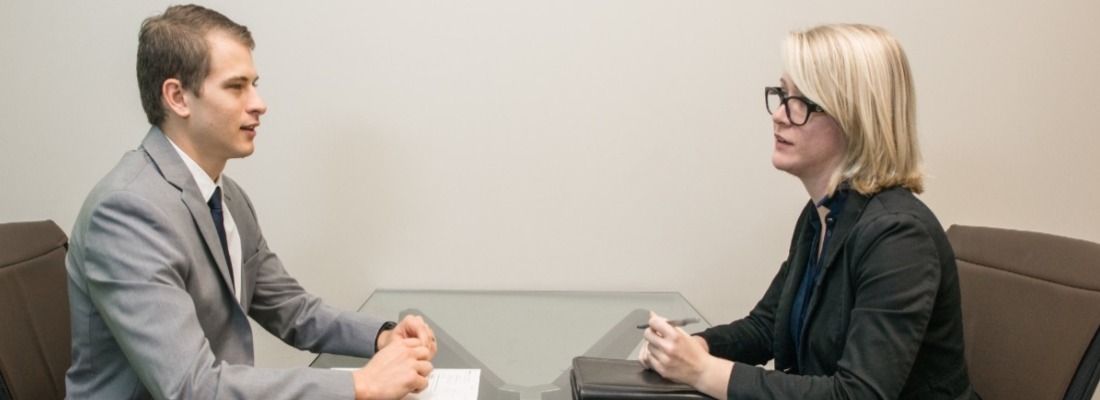Imagine the situation, you’ve written a great CV, taken my advice and avoided job boards whilst concentrating your time on working within your network and sending your CV directly to hiring managers and finally you have a job interview. You spend an evening preparing, answering practice interview questions and on the day of your interview, performed well.
The problem – the last you heard from the hiring manager was the “good bye” as you left the room. What went wrong? It could be that you were just were not right for the company or it could be you got your body language wrong and put off the hiring manager.
Body Language
Less than 10% of what we really say comes from verbal communication. The rest comes from how we say it, how we speak, how we sit and what we look like.
Slouch in your chair and you look bored and uninterested, cross your arms and you look defensive whilst sitting up straight, leaning slightly forward shows that you’re interested and listening.
All to often I send candidates to a job interview that they’re perfect for. The candidate speaks with me afterwards and feels they had a great interview, however the feed-back from the hiring manager is not positive and needless to say, they’re not asked for a second interview. Generally the feed-back is often pretty limited, however it basically says, the candidate did not look interested in the position.
In my candidate preparation, I often discuss body language with my candidates and watch them nod away as if to tell me they know this and I’m wasting my time.
Body Language Tips
If you’re going to get one thing right during your job interview, get your body language correct. Make sure what comes out of you mouth, is not directly countered with what your body language is telling the hiring manager.
Below are my top job interview body language tips to help you pass your next job interview.
The Professional
Your job interview starts the minute you leave your home. You never know who you’re going to meet on your way to your interview. So often I have met candidates walking down the road at 7.30am, looking an utter mess.
Most cities are very small, with offices close together. It’s very easy to spot the person who is looking lost, trying to find the right building. Be careful, receptionist do report what they see in the waiting room. It’s not a good idea to sit with your legs stretched out, sloughing with your suit jacket wide open and your hands on the back of your head, as it really gives off that “I cannot be bothered look”.
Make sure that you’re ready to go, your tie is on and you’re looking smart from the moment you leave your house. Try to act like a professional, who is organized, looks the part and most importantly polite, especially to receptionists.
Interview Start Time?
Running late is a sure fire way to get the nerves going which is not something you need during your job interview. It’s also not acceptable unless you have a really good reason. I have many clients that feel if a candidate cannot be bothered to turn up on time, they cannot be bothered to meet them
Arrive too early and you could look desperate and overly keen to impress. My advice is to arrive 5-10 minute before your interview starts. If you arrive earlier, wait around the corner and not directly in front of the building.
Often you meet candidates pounding the pavements directly outside the office. This can show that you’re nervous and lacking confidence which will come across in your job interview body language.
First Impressions Count
Like it or not, interviewers are going to make a judgment on whether they like you in the first 30 seconds. If you get this really wrong, your interview could be over before it’s begun.
The good news, the first 30 seconds comes down to three things, what you look like, your greeting and the first few questions you ask to get the interview moving in the right direction.
The Dress Code
Let’s be honest, dressing for a job interview whether you’re male or female is not difficult and not something to worry about. My advice, unless you specifically told not to, wear a nice navy blue suit that you can either tone up with a tie or if needed tone down by removing your tie.
This is the easiest and most suitable dress code for both men and women. If you’re dressed to casually, you could be showing that you’re not serious about this job.
Watch out for your personal hygiene, avoid wearing too much cologne or perfume, make sure that you hair is clean and well groom and your makeup is minimal.
Meet and Greet
How you greet the hiring manager shows what you’re like as a person, your confidence levels and even your attitude. It’s important to learn how to give a good handshake as this can say so much about a person.
Squeeze to hard and you will look overly enthusiastic, but offer a limp handshake and you look weak and lacking in confidence. To get your hand-shake right, take your right hand and hold it out with your hand parallel to the floor, your thumb pointing to the ceiling, and connect directly into your partners hand until your thumbs and index finger touch, then wrap your thumb and fingers around your partners hand and add some pressure.
Building Rapport
The final part of a great first impression comes down to those few questions where your objective is to build up some basic rapport with the interviewer. The idea here, you’ll have done a little interview preparation and either have a few topics that relate to the company or found some mutual common ground with the interviewer from past working companies or even colleagues.
If you spend the first ten minutes with some general conversation, not only will it relax you, it’ll relax the interviewer and potentially could get the hiring manager on your side. Hiring managers want to work with candidates they like. If you’ve built some basic rapport with the hiring manager, it will put you at a great advantage.
Seating Position
Often you’ll be directed into an interview room and have no choice where to sit. If you’re going to be meeting with more than one person, then usually your interview will take place in a large meeting room suited for 8-10 people.
My advice in this situation is to hover around and see what chairs the interviewers are aiming for before you make your decision. The corners of a large tables are always best if you’re just being interviewed by one person, however if a number of people are interviewing you, then sit opposite each other so that you don’t have to move your head too much to make eye contact with the whole group.
Smile
No one wants to recruit a boring, grumpy person who potentially will also depress the rest of the group with their terrible vibes. Make sure you smile and at least look like your enjoying yourself. A nervous smile is much better than no smile at all.
It’s also very acceptable to laugh if the situation warrants it, however make sure that you don’t make silly jokes just for the sake of trying to introduce a laugh into the conversation. With a terrible joke, you might find that you’re the only one laughing.
Hand Movements
Your hand movements tell a lot about you. Are you ever nervous about doing a presentation in front of a group of people. What part of your body starts shaking first? Your hands.
During your job interview, it’s a great idea to clasp your hands together in front of you on the desk or if you’re not at a desk, then on your lap.Putting your hands behind your neck or on top of your head is a sign of arrogance, whilst scratching your face or fiddling with your hair shows that you’re nervous. Touching your nose or mouth is a sign that you are lying, whilst folding your arms together means that you’re defensive.
If you’re getting nervous during interviews, but want to show that you’re confident, either keep your hands together or take a pen and paper to the interview and try to write things down.
Arm Movements
Moving your hands and arms around when you speak is acceptable if this is the way that you behave normally. That all said, watch out that your movements do not become to distracting and take the focus away from what comes out of your mouth.
Have you ever been to a presentation where the presenter is waving their hands all over the place? I know I have, I also know that I spent half the presentation, wondering what the presenter was trying to draw with their hands in the air and not really listening to what they were saying.
If you want to use arm movements to get your point across. Make sure that you limit your movements to an imaginary square box in front of you that is no higher than your neck, no lower than the table and no further to the left or the right than your shoulders. If you let your hands go outside this imaginary box, then you run the risk that your interviewer will follow your hands and stop concentrating on you.
Head Movements
How you move and position your head can also send a message to an interviewer. Typically nodding whilst the interviewer is speaking means that you’re agreeing with what they’re saying, whilst tilting your head to one side will make you come across as friendly and open.
My advice is to keep your head firmly upright to show that you’re self-assured, confident and authoritative.
Watch Your Posture
Once you’ve shaken hands with interviewer and sat down, you need to make sure that you sit upright, but relaxed position in your chair to give a positive impression that you’re comfortable and feeling confident.
If you slouch in your chair, this will show that you really don’t care, whilst a hunched back and a staring at the table means that you’re nervous and have no confidence. Lying back into your chair means that you’re too relaxed and casual and could come across arrogant.It’s my advice that you sit upright, but relaxed and lean slightly forwards, about 10-15 degrees towards your interviewer. This will give the impression that you’re both interested in taking the interview seriously.
Your Legs
If you’re sat in front of a desk, then it doesn’t matter so much as no one is going to be looking underneath the desk to view your legs, however if you’re sat at the corners of a large table or in an open space, you need to be aware of your leg movements.
Moving your legs around is both distracting and shows that you’re nervous, whilst crossing your legs up high gives the impression that you are defensive or hiding something and putting you ankle or leg on top of your knee can come across arrogant.The best practice is to place both feet flat on the floor as this shows that you are confident, relaxed and give a professional view of you.
Your Voice
To convey confidence and professionalism, you need to make sure that you speak in a very clear and controlled manner at all times. If you sound to monotone, you could come across boring and lacking personality.
That said, watch out that you don’t overdo it otherwise you could give that impression that your childish and emotional. You need to make sure that you speak with the interviewer as an equal.
Try to breathe before you answer each question as this will give you time to think about your answer. Watch out that the interviewer has finished the question before you butt in.
Your Eye Contact
You need to make sure that you maintain eye contact with your interviewer, otherwise you could come across distant and insecure which is a sure sign of poor body language.
There’s a fine line between being attentive and being scary so alternate where you look during the course of the interview. If you don’t like looking directly into people eyes then try looking at their nose or mouth.
Conclusion
Positive body language comes from confidence that you can only do if you’re prepared for the job interview and therefore able to show off your skills and ask the right questions.If you fail to prepare then prepare to fail..
Nick Jones
Latest posts by Nick Jones (see all)
- What Job Should I Do? It Depends on Whether You’re An Introvert Or An Extrovert - November 17, 2021
- Ten Ways to Unplug and Recharge During The Holiday Season - November 3, 2021
- 10 Jobs for Teenagers to Earn Extra Money - October 13, 2021








